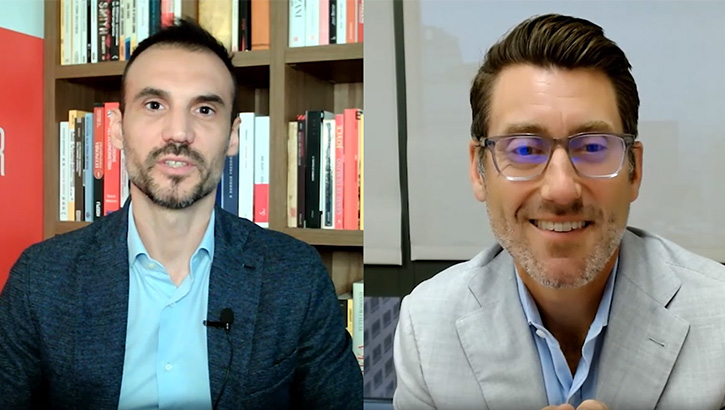Ollie Smith: Now, last week I brought you some mini stories from underneath the bonnet of bonds in 2023 and this week that mission continues in earnest with a look at bond funds. So, joining me to help with that mission is Giovanni Cafaro, one of our manager research analysts. Giovanni, thanks for being with us.
Can you tell me a little bit about how global flexible bond funds performed last year?
Giovanni Cafaro: Sure. So, after a very sharp repricing in 2022, we've seen bond markets really recovered last year, as economies proved to be surprisingly resilient within a corporate bond space, high-yield indices outperformed and that's in part driven by the higher yield levels offered at the start of the year compared to what they were at the end of 2021. Duration proved to be a performance driver in 2022, but that's been less of a clear-cut factor. Last year, we've seen consensus shift to a higher for longer narrative on rates with upside surprises in yields through the year, but they were tempered in some way through last quarter of the year. More broadly, we've seen corporate bonds outperform government bonds. So, the bias to credit that a large number of global flexible bond funds has proven to be beneficial for their performance through the year, but nonetheless we've seen managers of global flexible bond funds be tactical through the year, so adjust their portfolios' top-down risk drivers in a tactical way, look for attractive cross-sector worthy value opportunities and with regards to issuer selection being a bit more selective and looking for more resilient names.
OS: Sure, and let's just focus on that tactical approach of the managers for a second. How have they approached the topic of quality when it comes to this topic?
GC: Investors entered 2023 grappling with the risks and implications of a potential economic slowdown or a recession and that led managers to really improve the credit quality of their portfolios, and this has meant a preference for investment grade credit more broadly. That said, high yield bonds offer relatively attractive yield levels that can provide some cushion for potential widening in spreads. But on the other hand, we see managers paying close attention to what higher interest rates could mean for some issuers in terms of, I guess, refinancing stress and a potential uptick in defaults. So, relative value are clearly at play here, but investment grade credit is thought to have, I guess, the right trade-off between attractive total returns and potentially better resilience to market downturns compared to high yields. So, for instance, the portfolio management team of the Franklin Templeton Western Asset Global Multi Strategy Fund took the opportunity to take profits and reduce their location to high yield and emerging market debt through the year. The reduction in allocation in the high yields bucket was broad based, but with a bias to sectors like cyclical, consumer, transportation and industrials, and the current allocation remains, I guess, biased to higher-quality names with a preference for BB or B rated bonds and on the less cyclical sectors.
OS: Sure. So, credit quality up. How have they been approaching tilting for duration?
GC: Sure. The compelling yield levels coupled with the anticipation of the end of the monetary tightening cycle and potential rate cuts on the horizon has led managers to extend broadly the duration of their portfolios, but to varying degrees. For more part of the year, this has been a headwind for returns as we've seen upside surprises in yields, but these were tempered in the last quarter of the year. Nonetheless, we've seen managers being quite tactical. They managed the duration profile of their portfolios and its composition. For instance, the managers of the Schroder Global Credit Income Fund managed their headline duration between four and five years, also tactically through that range. As they didn't fully buy into a soft lending scenario last year, they showed a preference for European rates, but they traded UK and US rates tactically.
OS: Fantastic. And just finally, tell me about financials. What's attractive about financials?
GC: Sure. So, among various corporate bond sectors, financials have been under the spotlight last year. We've seen how events, including the US regional banking crisis and Credit Suisse takeover took a toll on investor sentiment and the sector went under pressure early in the year, but then recovered through the second half of the year. And we've seen how managers took advantage of this opportunity and repricing in the sector to increase their allocation to financials. And broadly, managers see this sector attractive from both valuation and fundamental perspective.
So, looking at valuations, the spread between financials and non-financial sectors widened quite a lot through 2022. And from a fundamental perspective, they see major banks or financial institutions as quite solid, well capitalised and diversified. And this provides them with an opportunity to invest across their capital structures. And for instance, the managers of the Morgan Stanley Global Fixed Income Opportunities Fund maintain their long-term bias to financials and in their high-risk budgets, they can invest in a subordinated space as well. And they had an opportunity to invest in a mix of lower Tier-2 bonds issued by banks or insurance companies through the year, and they see opportunity in these types of instruments.
OS: Fantastic. For more on bonds and fixed income, check out any of our fixed income articles on Morningstar.co.uk, including I might add our latest article on why 60/40 isn't quite so dead after all. Until next time, my thanks to Giovanni, I've been Ollie Smith for Morningstar.




























